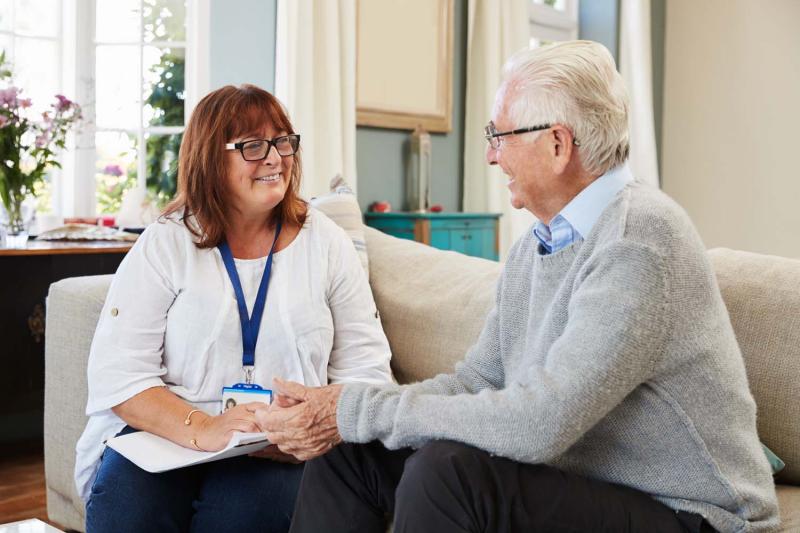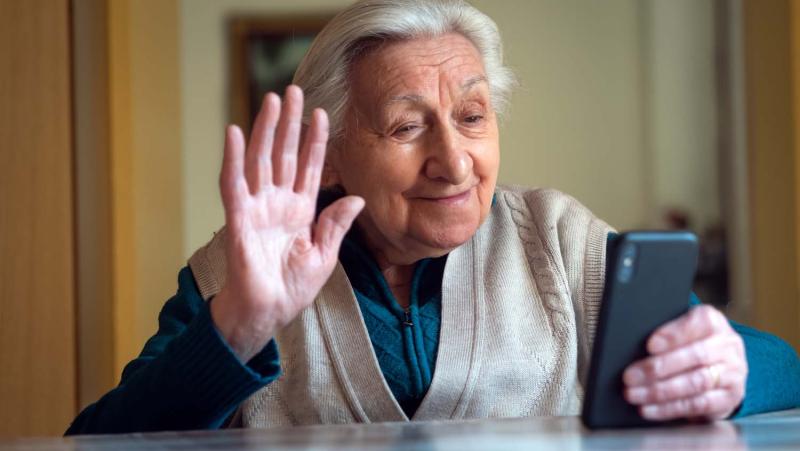Key points
- Older people are predisposed to being socially isolated.
- Awareness of the impacts of social isolation is important to prevent the negative effects and implement strategies to avoid these negative outcomes.
- Social isolation commonly leads to cognitive problems related to memory and recall and sleep problems such as increased sleep disturbances and poorer sleep quality. A higher risk of dementia was also found among older people who are socially isolated.
- The COVID-19 pandemic increased social isolation problems due to social distancing measures and mandatory restrictions that were implemented particularly in residential aged care settings.
Older people are predisposed to being socially isolated. As individuals age, their circle of family and friends is get smaller, and their health and physical function deteriorate so they may spend more time being alone. In addition, some people living in residential aged care may find it difficult to make new relationships with other residents. This scenario may impact their health and wellbeing undesirably. [1]
Problems related to social isolation were intensified during the COVID-19 pandemic. To protect older people from getting sick, social distancing guidelines restrictions and other restrictions were implemented. [2] Friends and families of the older people were not allowed to visit them in person leaving older people feeling more isolated. The uncertainty of the situation also led to heightened feelings of anxiety. [2]
This evidence theme is a summary of one of the key topics identified by a scoping review of social isolation research. If you need more specific or comprehensive information on this topic, try using the PubMed search below.
We found nine reviews that reported on the impacts of social isolation. [2-10] Findings were:
Cardiovascular disease (CVD)
One review reported on incidence of cardiovascular disease and found no association with social isolation or social health measures. [3]
Cognitive function
Two reviews considered cognitive function in relation to social isolation. [4, 5] Low levels of social activity and poor social networks were found to result in poor cognitive function which include global cognition and memory executive function, however only to a small degree. [4] Those living alone had poorer word list recall as a measure of memory compared with those living with partner. [5]
Sleep disturbance and sleep quality
One review reported on studies that used objective measures of social isolation such as the Lubben Social Network Scale (LSNS), Social Disconnectedness Scale, social network size and other tools. [6] This review found that there was more sleep disruption among older people without a partner than those with a partner and isolated older people than those who socialise more. Being single was a significant factor in having sleep disturbances. In addition, the quality of sleep is affected by social network such as relationships with families and friends. [6]
The same review also reported on studies that used subjective measures of social isolation that related to loneliness. These measures included the University of California, Los Angeles (UCLA) Loneliness Scale, De Jong Gierveld Loneliness Scale, items of the Center for Epidemiological Studies Depression scale (CES-D) and a four-item questionnaire consisting of ‘feeling lonely, being cared for, wishing someone for comfort, and wishing for more close friends. [6] Loneliness as a subjective measure of social isolation was related to poorer quality of sleep and more sleep disturbances. Moreover, loneliness in this context, also affected specific sleep domains such as sleep latency, subjective quality of sleep, duration of sleep, use of sleeping medication and daytime dysfunction. [6] It was also reported that sleep problems occurring as a result of being social isolated and lonely can result in increased feelings of social isolation and loneliness. [6]
Risk of dementia
Two reviews reported on risk of dementia. [7,8] Older people who are more socially isolated (i.e., less social participation, less social contact and/or relationships) have a higher risk of developing dementia, [7,8] and feelings of loneliness. [8] Limited evidence was reported about the impact of small social network and the risk of dementia. [7]
Covid- 19
Three reviews reported on the impact of COVID-19 pandemic and the mandatory social distancing restrictions that resulted in older people becoming more socially isolated. [2,9,10] The pandemic and mandatory restrictions intensified feelings of anxiety, frustration and boredom. [2] More worryingly, mental health problems such as depression, sleep problems and suicide were also felt by socially isolated older adults. [2] Social isolation and lack of meaningful communication increased feelings of loneliness at the time of the pandemic. [10]
- Encourage interactions where possible. Be aware of certain individuals who seem to be socially isolated, even though most of them may not recognise it. Monitor their psychological wellbeing using a formal tool or suggest a general practitioner check on their mental health to see if psychological intervention is required.
- Engage health professionals proactively to support issues that may limit engagement (i.e., physiotherapists, OT, optometrist, audiologist)Get to know individuals and what topics they like to talk about and try to find areas of common interest. Try new hobbies and technologies to facilitate engagement and connection.
- In a residential aged care setting, try to encourage people who may be feeling isolated to get involved in the facility’s social activities. This may involve extra planning and effort on the part of staff if there are physical limitations that prohibit participation.
- Home care workers might develop a list of local community programs that foster social connection to suggest to lonely clients. Be sure to check if the person has the means to get to any activities.
- Ask and refer people who may want to volunteer in providing meaningful and engaging activities in specific organisations, to prevent social isolation and loneliness among the older people.
- Advocate for prevention of isolation with the client and key stakeholders.
- Provide staff training on recognising the signs of social isolation. Provide them with strategies to respond to this important issue.
- Contact any family and friends of an older person who appears to be socially isolated to ensure they are aware of the situation. Suggest they arrange for the person to have some form of contact using digital devices if physical visits are not feasible.
- Undertake regular assessments for issues of isolation including sensory inhibiting factors (i.e., age related hearing problems) and more thorough assessment of clients’ backgrounds, choices, and history to promote interests related to their past and present.
- Completely review the structure and choices of activities available to clients in the facility. Review schedules to promote socialisation activities of interest.
- Engage a lifestyle coordinator to implement activity programs to ensure social connectedness. These could be as simple as movie events and card games or other activities based on the interests and preferences of the older people.
- Review design layouts to maximise opportunities for engagement. Review seating plans for meals, outings to encourage new friendships.
- Recruit volunteers and community members to help provide and facilitate activities for the older people in the community and in residential aged care settings.
This evidence theme has been informed by the results of a scoping review intended to map the published research in this area. Our findings reflect the current state of the evidence which we note is limited in breadth and quality.
- Gardiner C, Laud P, Heaton T, Gott M. What is the prevalence of loneliness amongst older people living in residential and nursing care homes? A systematic review and meta-analysis. Age Ageing. 2020;49(5):748-757. doi:10.1093/ageing/afaa049
- Rodrigues NG, Han CQY, Su Y, Klainin-Yobas P, Wu XV. Psychological impacts and online interventions of social isolation amongst older adults during COVID-19 pandemic: A scoping review. J Adv Nurs. 2022 Mar;78(3):609-644.
- Freak-Poli R, Phyo AZZ, Hu J, Barker SF. Are social isolation, lack of social support or loneliness risk factors for cardiovascular disease in Australia and New Zealand? A systematic review and meta-analysis. Health Promot J Austr. 2022 Oct;33 Suppl 1(Suppl 1):278-315.
- Evans IEM, Martyr A, Collins R, Brayne C, Clare L. Social Isolation and Cognitive Function in Later Life: A Systematic Review and Meta-Analysis. J Alzheimers Dis. 2019;70(s1):S119-S144.
- Kang JW, Oremus M. Examining the Combined Effects of Social Isolation and Loneliness on Memory: A Systematic Review. Arch Gerontol Geriatr. 2023 Jan;104:104801.
- Azizi-Zeinalhajlou A, Mirghafourvand M, Nadrian H. The contribution of social isolation and loneliness to sleep disturbances among older adults: a systematic review. Sleep Biol. Rhythms. 2022;20:153–163.
- Kuiper JS, Zuidersma M, Oude Voshaar RC, Zuidema SU, van den Heuvel ER, Stolk RP, Smidt N. Social relationships and risk of dementia: A systematic review and meta-analysis of longitudinal cohort studies. Ageing Res Rev. 2015 Jul;22:39-57.
- Lazzari C, Rabottini M. COVID-19, loneliness, social isolation and risk of dementia in older people: a systematic review and meta-analysis of the relevant literature. Int J Psychiatry Clin Pract. 2022 Jun;26(2):196-207.
- Todd E, Bidstrup B, Mutch A. Using information and communication technology learnings to alleviate social isolation for older people during periods of mandated isolation: A review. Australas J Ageing. 2022 Sep;41(3):e227-e239.
- Zhang D, Lu Q, Li L, Wang X, Yan H, Sun Z. Loneliness in nursing homes: A qualitative meta-synthesis of older people's experiences. J Clin Nurs. 2023 Oct;32(19-20):7062-7075.

